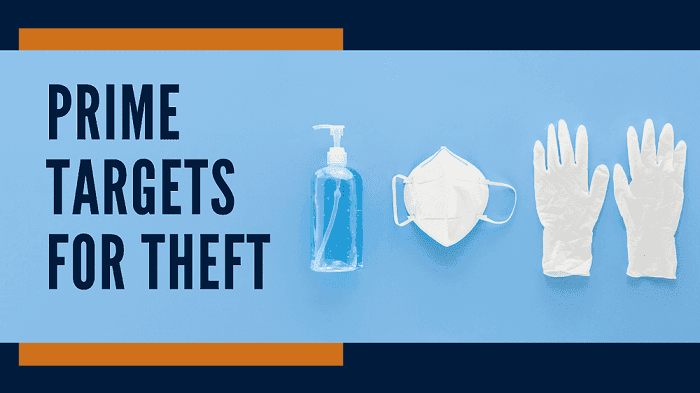August 20, 2020 | Cargo Insurance, Industry Insights
Criminals Exploit COVID-19 Pandemic with PPE Theft, Counterfeit Products

Beefing Up Mitigation Measures Essential for Supply Chain Security
The coronavirus has upended our lives and businesses with stay-at-home orders, shutdowns, and limited crews to handle ongoing operations with remote work as the new normal. Amid this changing environment, criminals are taking full advantage of the disruption and high demand for personal protective equipment (PPE). Everything from medical-grade N95 masks to surgical gloves, gowns, test kits, and ventilators along with consumer goods such as hand sanitizers, toilet paper, disinfectants, and cleaning solutions are prime targets for counterfeit products and theft. For example, in April, 15,000 coronavirus diagnostic tests and more than two million personal protective items — including goggles, gloves, hand sanitizer and facemasks — were stolen from a cargo terminal at São Paulo’s Guarulhos International Airport in Brazil.
“Organized crime groups are involved in PPE thefts around the world, including here in the U.S. at ports in New York, Chicago, and Los Angeles,” explains Cyndee Garbrecht, VP, Claims Administration, Roanoke Insurance Group. “You’re seeing counterfeit N95 masks being delivered as well as shipments disappearing. PPE is high-commodity cargo and in high demand, fitting right into a criminal’s wheelhouse.”
Cyndee sits on the board of the Midwest Cargo Security Council, a not-for-profit 501(c)3 organization dedicated to combating cargo theft. The Council is comprised of individuals from the National Insurance Crime Bureau (NICB), FBI, law enforcement and the insurance industry who most recently are examining and assessing the cargo theft and counterfeit trends being perpetrated in the wake of the pandemic. “We’ve seen theft of cleaning solutions on the rise in Mexico, while tens of millions of unusable counterfeit masks from China arrived in Chicago and Los Angeles back in April and May.
In addition to selling counterfeit products, shipments are being stolen once they arrive at a port or while en-route to their destination. The stolen cargo is either sold on the black market or re-shipped to China to be sold to another customer. “We’ve had one freight forwarder request a pick-up upon the arrival of a shipment at the warehouse only to be told the cargo was not ready and to call again,” says Cyndee. “When the freight forwarder followed up, he was told the shipment was missing. In some cases, there is video footage that shows the cargo sitting on the dock and then mysteriously disappearing.”
Sometimes the cargo theft involves an inside job where an employee at the warehouse is affiliated with the criminals or being paid by them to look the other way. “It’s very difficult to catch these criminals,” Cyndee explains, “to understand their MO, but there are risk-mitigation measures the stakeholders throughout the supply chain can take. It’s important that shippers, carriers and freight forwarders take a heightened approach to protecting their cargo.”
Risk Mitigation to Help Prevent Cargo Theft
Following are several risk-mitigation measures to re-examine in order to protect cargo while in-transit from the shipper, at the warehouse and en-route to its final destination.
- • Do business only with a trusted agent with whom you are familiar. Make sure the agent is performing due diligence so that all cargo leaves intact and that it is indeed what the bill of lading or other descriptive paperwork says it is.
- • Impress upon shippers and consignees to conduct piece-and-carton counts at the delivery and verify the counts against the transit documents.
- • Review the guidelines in place for truckers so that cargo is secure and arrives at the location intact. Recommendations for drivers include:
- –Take the shortest route to the destination.
- –Don’t stop too often while in transit, particularly during the first 200 miles from the origination point.
- –Know how to recognize when you’re being followed, and note vehicles that seem familiar. For example, be aware if you see someone going in the same direction and getting off at the same exits as you for an hour or so. The quicker you can alert your company that you believe you’re being followed, the faster law enforcement can be notified.
- –Have alternative plans in place in case you are in an accident, become ill, or the vehicle breaks down to avoid criminals taking your load while you are otherwise preoccupied. Ensure there is an emergency plan in place.
- • Install GPS on the cargo, particularly if it’s a large load, for a monitoring company to track the shipment.
- • Once the cargo arrives, ensure protocols are in place to verify that any PPE is from authorized brand-name sellers. Inspect the packaging to ensure it’s legitimate, and analyze the product to make sure it’s not counterfeit. For example, if the respirator supplier says that their masks are FDA-approved, this should be treated as a red flag. Also, proper N95 masks will have elastic bands that wrap completely around the back of the head to keep them tightly sealed. Knockoff masks will often have elastic that wraps around only the ears. Immediately report any suspicious activity. NIOSH may be misspelled on counterfeit masks.
The pandemic and the disruption it has caused for many business operations is a big moneymaker for criminals. Take the time to revisit the protocols you have in place and beef up measures where gaps may exist.
Roanoke Insurance Group provides insurance solutions to the logistics service provider industry, including cargo insurance. For more information, please contact a Roanoke Insurance Group representative at 1-800-ROANOKE.












